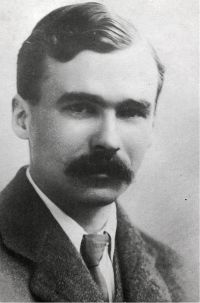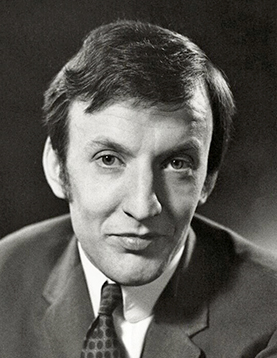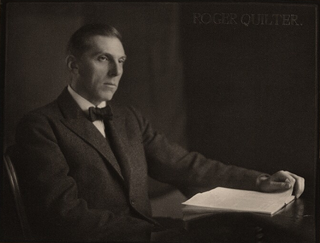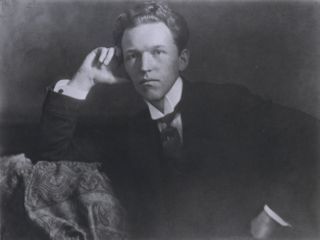Related Research Articles

Enoch Arnold Bennett was an English author, best known as a novelist who wrote prolifically. Between the 1890s and the 1930s he completed 34 novels, seven volumes of short stories, 13 plays, and a daily journal totalling more than a million words. He wrote articles and stories for more than 100 newspapers and periodicals, worked in and briefly ran the Ministry of Information in the First World War, and wrote for the cinema in the 1920s. Sales of his books were substantial and he was the most financially successful British author of his day.

George Sainton Kaye Butterworth, MC was an English composer who was best known for the orchestral idyll The Banks of Green Willow and his song settings of A. E. Housman's poems from A Shropshire Lad.

"Barbara Allen" is a traditional folk song that is popular throughout the English-speaking world and beyond. It tells of how the eponymous character denies a dying man's love, then dies of grief soon after his untimely death.

Sir Richard Rodney Bennett was an English composer of film, TV and concert music, and also a jazz pianist and occasional vocalist. He was based in New York City from 1979 until his death there in 2012.

Roger Cuthbert Quilter was a British composer, known particularly for his art songs. His songs, which number over a hundred, often set music to text by William Shakespeare and are a mainstay of the English art song tradition.
Roy C. Bennett was an American songwriter known for the songs he wrote with Sid Tepper, which spawned several hits for Elvis Presley. Between 1945 and 1970, Tepper and Bennett published over 300 songs.
John Ramsey (1887–1972) was a pseudonym used by Reginald Owen. He was co-author of the 1911 play Where the Rainbow Ends with Mrs Clifford Mills and music by R. Quilter. Owen provided stage know-how.
Where the Rainbow Ends is a children's play, originally written for Christmas 1911 by Clifford Mills and John Ramsey. The incidental music was composed by Roger Quilter.

Gervase Henry Cary-Elwes, DL, better known as Gervase Elwes, was an English tenor of great distinction, who exercised a powerful influence over the development of English music from the early 1900s up until his death in 1921 due to a railroad accident in Boston at the height of his career.
The Ash Grove is a traditional Welsh folk song whose melody has been set to numerous sets of lyrics. The best-known English lyrics were written by Thomas Oliphant in the 19th century.

Beatrice Harrison was a British cellist active in the first half of the 20th century. She gave first performances of several important English works, especially those of Frederick Delius, and made the first or standard recordings of others, particularly the first recording of Elgar’s cello concerto in 1920 with the composer conducting.

Frederic William Austin was an English baritone singer, a musical teacher and composer in the period 1905–30. He is best remembered for his restoration and production of The Beggar's Opera by John Gay and Johann Christoph Pepusch, its sequel, Polly, in 1920–23, and for his popularization of the melody of the carol The Twelve Days of Christmas. Austin was the older brother of the composer Ernest Austin (1874–1947).
The Frankfurt Group, also called the Frankfurt Gang or the Frankfurt Five, was a group of English-speaking composers and friends who studied composition under Iwan Knorr at the Hoch Conservatory in Frankfurt am Main in the late 1890s. The group included H. Balfour Gardiner, Norman O'Neill, Cyril Scott and Roger Quilter, who were all English, and Percy Grainger and Frederick Septimus Kelly, who were born in Australia but established themselves as composers in England. Although they did not study in Frankfurt all at the same time they remained close friends from their student days onwards.
Frederick B. Kiddle was a prominent English pianist, organist and accompanist.

The Bonzo Dog Doo-Dah Band was created by a group of British art-school students in the 1960s. Combining elements of music hall, trad jazz and psychedelia with surreal humour and avant-garde art, the Bonzos came to public attention through appearances in the Beatles' 1967 film Magical Mystery Tour and the 1968 ITV comedy show Do Not Adjust Your Set.
On with the Dance is a 1925 musical revue produced by C. B. Cochran, written and composed by Noël Coward and Philip Braham. Coward wrote his songs while he was acting in his first stage hit, The Vortex. 1925 was a busy year for Coward, in which he produced three other plays in London: Hay Fever, Fallen Angels and Easy Virtue.

Frederick Ranalow was an Irish baritone who was distinguished in opera, oratorio, and musical theatre, but whose name is now principally associated with the role of Captain Macheath in the ballad opera The Beggar's Opera, which he sang close to 1,500 times. He was also a minor film actor and writer of songs.
Rodney Bennett (1890-1948) was a playwright, children's author, and lyricist, who also wrote under the name Royden Barrie. He was the father of the poet M. R. Peacocke and the composer Richard Rodney Bennett.

Sigwart Botho Philipp August zu Eulenburg, Count of Eulenburg was the second son of Philipp, Prince of Eulenburg (1847–1921) and his wife Augusta, born Countess of Sandels (1853–1941) and a German late romantic composer who fell in the First World War.

"Erlkönig", Op. 1, D 328, is a Lied composed by Franz Schubert in 1815, which sets Johann Wolfgang von Goethe's poem of the same name. The singer takes the role of four characters — the narrator, a father, his small son, and the titular "Erlking", a supernatural creature who pursues the boy — each of whom exhibit different tessitura, harmonic and rhythmic characteristics. A technically challenging piece for both performers and accompanists, "Erlkönig" has been popular and acclaimed since its premiere in 1821, and has been described as one of the "commanding compositions of the century".
References
- 1 2 3 4 Music Web International, Roger Quilter (1877-1953): Complete Folk-Song Arrangements and Complete Part-Songs for Women's Voices
- 1 2 Langfield, p. 200
- 1 2 3 Langfield, p. 202
- 1 2 3 Naxos Direct
- 1 2 3 4 Classics Online Archived September 24, 2014, at the Wayback Machine
- ↑ Langfield, p. 50
- 1 2 Music Web International
- ↑ Langfield, p. 131
- ↑ Langfield, p. 174
- ↑ Langfield, p. 103
- ↑ Langfield, p. 105
- ↑ Langfield, p. 197